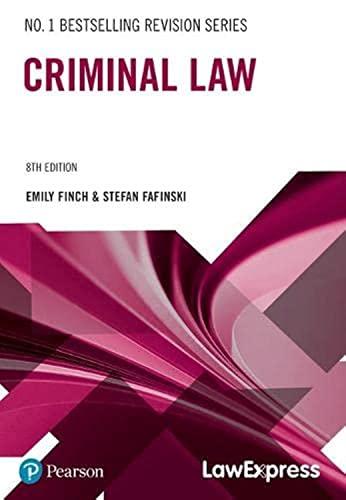Question
1.Why did mass incarceration begin when it did? 2.What does Alexander mean when (quoting Reva Siegel) she calls slavery, Jim Crow, and mass incarceration preservation
1.Why did mass incarceration begin when it did?
2.What does Alexander mean when (quoting Reva Siegel) she calls slavery, Jim Crow, and mass incarceration "preservation through transformation"? (p. 21)
3.Alexander argues that the new Jim Crow is part of a long line of systems of racial control and domination in the United States. She also argues that it emerged in part out of an electoral strategy (the "Southern strategy") and that key institutions (e.g., law enforcement institutions) effectively had to be bought off to support it. How should we understand the relationship of the new Jim Crow to racial oppression/domination, in terms of its origins and its effects?
4.Consider Alexander's argument about the origin of the War on Drugs, and tell an analogous story about the origins of the War on Terror. Is the analogy, or are limits to the analogy, revealing?
5.Was the new Jim Crow inevitable? What would have had to be different to have prevented it?
I.Resisting the new Jim Crow
1.Why has there been so little challenge to the new Jim Crow?
2.What does Alexander identify as the biggest barriers to resisting the new Jim Crow? Are there other important ones she leaves out? How might these barriers be overcome?
3.According to Alexander, how is rejection of the stigma associated with the new Jim Crow reflected in popular culture, and does this aid or hinder resistance? Do you think that there could be a more positive culture of resistance? What might it look like, and how could it come about?
4.Why does Alexander say that the Jena 6 struggle could not have given rise to a broader civil rights struggle? Following this logic, what might a campaign that could spark such struggle look like? If it had focal individuals (like the six teenagers in Jena), what kind of people in what kind of circumstances might they be?
5.Evaluate Alexander's critique of the "politics of respectability" as a strategy for resisting the new Jim Crow. Relate this to Civil Rights Movement history that you are familiar with, or other social movements.
Step by Step Solution
There are 3 Steps involved in it
Step: 1

Get Instant Access to Expert-Tailored Solutions
See step-by-step solutions with expert insights and AI powered tools for academic success
Step: 2

Step: 3

Ace Your Homework with AI
Get the answers you need in no time with our AI-driven, step-by-step assistance
Get Started


